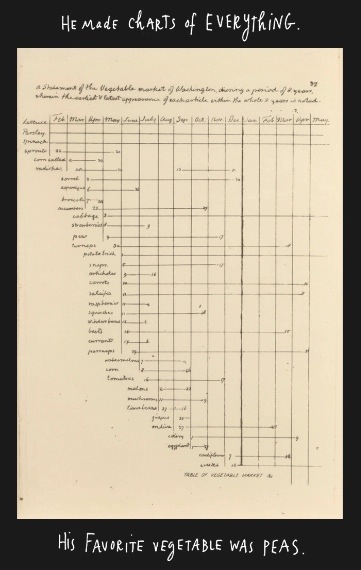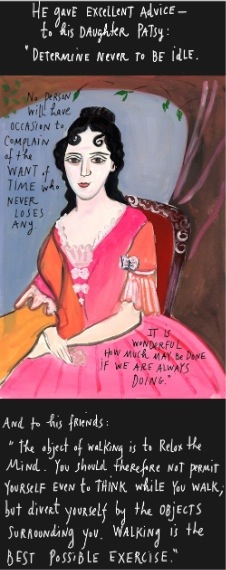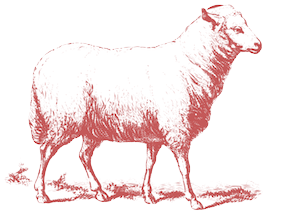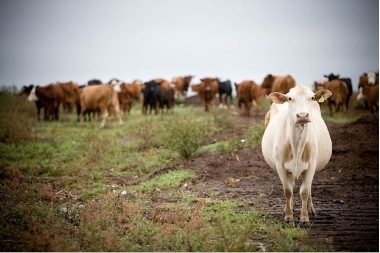I ran across this today, which made my heart leap for joy. Maria Kalman, who is undoubtably one of my favourite writers/ artists in existence did a piece for the New York Timeson her trip to Monticello. Wowza.
My favourite frames in the piece:
 and,
and,

The image of the chart made my heart skip. Here was some sort of proof that Jefferson was a farmer that linked to me. I too have this chart, torn from a local organics magazine, posted in my kitchen. It's not hand drawn, and it has colours and graphics and an all the trappings of modern printing, but it's fundamentally the same: seasons were the same for Jefferson as they are for me. A stones' throw into history and there it is, people eating asparagus in April, melons in August, eggplant in October, and carrots almost year-long. Jefferson bothered to make a chart of what was at market and when. This was important information that somehow we have collectively forgotten to take note of until very recently, and it's only the smallest handful.
The second image, the one of Jefferson's daughter, gets me at a very personal level. I think it amusing that Jefferson outwardly seems to deplore idleness in this quotation, considering the fact that it is only by idleness that he was able to accomplish so much. The best teacher I ever had regularly quoted Cervantes' address to his audience in the prologue to Don Quixote, "Desocupado lector, " idle reader. For my teacher, idleness was an incredibly important idea. Only the idle have time to read. Idleness, in essence, my teacher defined as time not spent in the pursuit of survival. He interpreted this idea slightly differently than I do. For my teacher, idleness is created when we don't have to hunt or gather or farm or make clothes; it is the work we do when there is no work that we must do. For my teacher, idleness is the product of a refined society that allows for "idle pursiuts" such as reading and writing, inventing algebra or triple-sash windows. Of course, this idea begs the argument that the whole reason we have people who can be idle and who can engage in idle prsuits is because others cannot afford to; that there are some who must always be working in order for others to be idle. Let's use Jefferson as an example, who, despite his intellectual passion for agriculture, had slaves to work his fields. Because of their lack of idle time, Jefferson had an abundance of it, in which he could walk and wonder at the world and do things like make charts of when things were growing. In essence, the reason some can is by the fact that others cannot. This is a problem. Yet, if we had no idle people, we would not have symphonies, epic poetry, the calculus, film, newspapers, iPods, indeed any of the great and small creative endeavors that make us human.
I would therefore, like to posit a slightly different philosophy of idleness. In essence, it is this: Only when we as human beings become fully competent at what we must do to survive can we fully create and enjoy the things we must do in order to be human. I often consider the moment in Masonobu Fukuoka's One Straw Revolution when he describes how he found bits of poetry tucked into the walls of his old farmhouse; he exposits that the farmers of the past did not toil endlessly in the fields, rather, they had time for poetry as well as time for the growing of crops. Fukuoka suggests that in our contemporary effort to make agriculture more productive, we somehow make the work less efficient for the farmer and his or her quality of life suffers tremendously as a result. When a handful of farmers work all day and all night so that others do not have to work the soil at all in order to eat, their time for idle pursuits is co-opted. Fukuoka shows us, however, that it does not have to be this way, he thinks, as do I, that there is room for both, indeed, there must be room for both.
Jefferson would have undoubtably loved Fukuoka. Indeed, when I am asked what historical figures I would like to have dinner with, it would, without question, be these two men; mostly because I believe Jefferson would have been fascinated by and learned tremendously from Fukouoka. The way Fukouka learned from the land, the way he watched and mirrored nature in order to let her do most of the work of farming, in essence, the way a little bit of very hard work and careful observation and interpretation of nature could yield plenty of food as well as plenty of time, time that allows for both survival and idleness, without the moral uncertainty that plagued Jefferson (at least in this one respect) would have be a marvelous discussion to overhear.
Fukouka, and those precious few farmers out there like him are fully competent at what they do, have time, time to write books, give lectures, cook meals, teach their children; they have time to consider new inventions that will make their lives a little easier, they have time to walk, time to participate in politics, and as Jefferson exhorts, time to think and time to wonder at what they do all day. The fully competent farmer must know how to do a bit of absolutely everything. We have sadly relegated farming into the realm of specialization, but specialization, we are wisely told, is for insects. There is nothing that can't be learned through farming for it keeps us "always doing."

